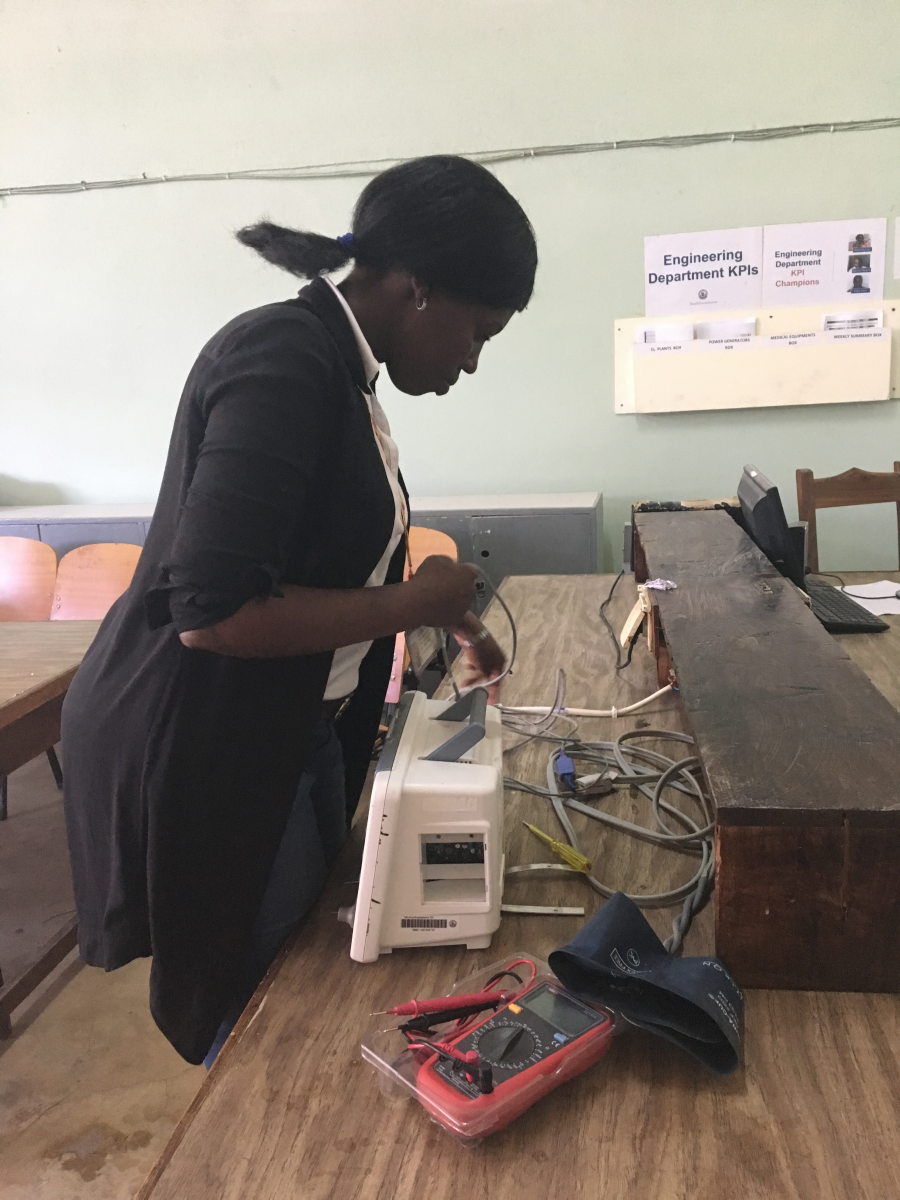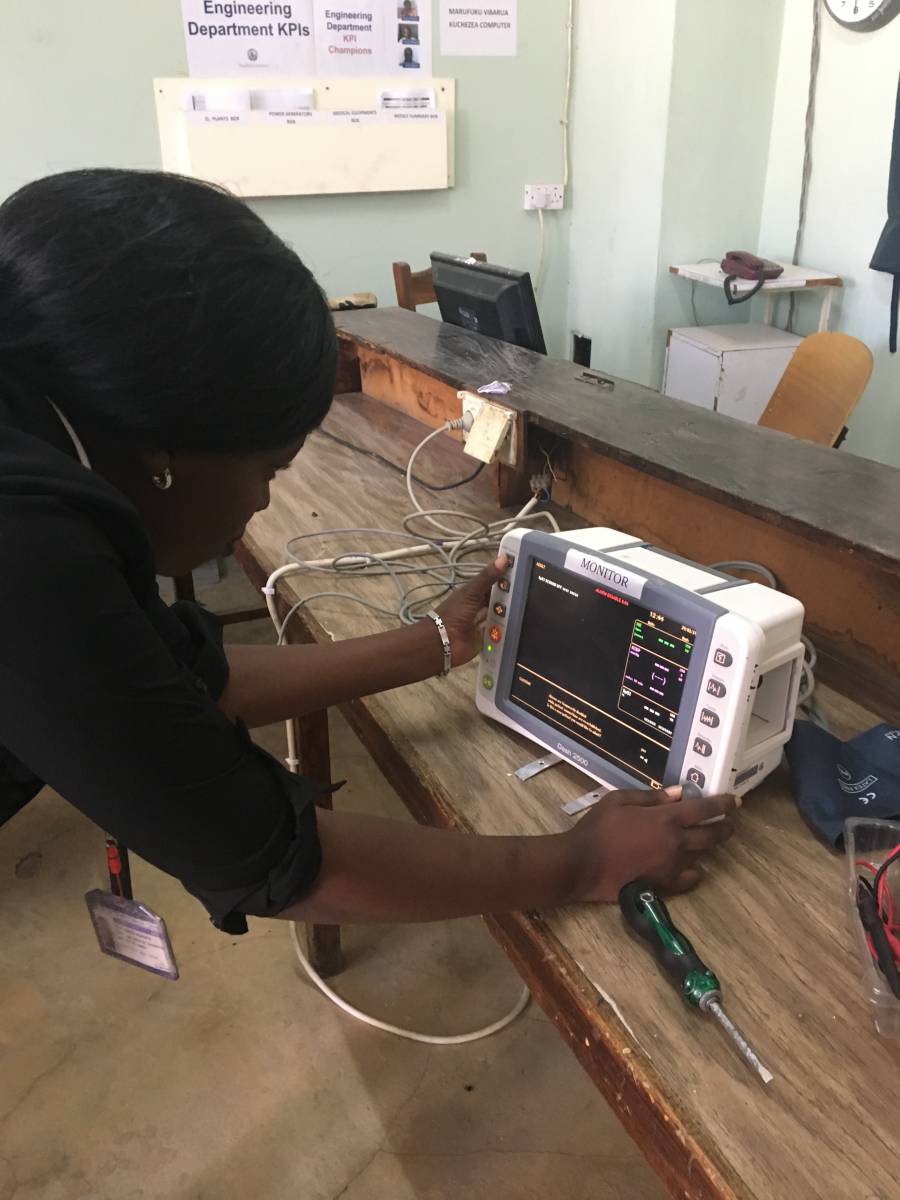Why Hospital Medical Equipment Maintenance Is So Critical To Saving Lives, As Told By One of Tanzania’s Few Female Biomedical Engineering Technicians
Authored by Taylor Birnbaum and Jessie Cohen, Touch Foundation
“When you say that you’re an engineer some people say ‘really?’ or they look at how you look physically and say, ‘can you really be an engineer?’”
Those are words from Nziza Pachal Rufutu, a 28-year-old woman working as a biomedical engineering equipment technician at Bugando Medical Centre (Bugando) in Mwanza, Tanzania. She is responsible for installing medical equipment and performing preventive maintenance and repairs at one of the largest and most specialized hospitals in the country. Nziza has taken on the responsibility of Key Performance Indicator (KPI) Champion at Bugando, and in this role she works with others in her department to monitor quality indicators of large machines that are vital to patient care and hospital operation, such as oxygen plants and generators, and ensures they are functioning properly. She also frequently discusses the importance of KPIs with her colleagues, and brainstorms new ways to utilize KPIs in the department. Nziza’s role is critical to ensuring that equipment is functioning properly, so that the hospital can provide quality healthcare services.
From a young age, Nziza excelled in science classes. After finishing her A-levels (similar to the Advanced Placement programs in the US), Nziza considered a career in engineering. Her brother, who was at University studying to become an engineer himself, introduced her to the field of biomedical engineering. She realized that this field would allow her to link her interests in biology and medicine with engineering principles to help others.

Nziza works on a Patient Monitor which is used to capture patient vital signs and provide cardian monitoring to help accurately detect arrhythmias. Photos by Jessie Cohen, Touch Foundation.
Upon graduating, Nziza applied for a job at Bugando and has worked there since 2016. Nziza oversees the engineering side of the sterilization department at Bugando and, together with other engineers, works closely with the operating theaters to ensure that all equipment is in good working condition for surgeries.
“Engineers provide oxygen and other medical equipment services in operating theaters,” says Nziza. “If the equipment performance is poor, then the doctors and other medical personnel can’t provide good healthcare services to the patients.”
One of her primary challenges working in the male-dominated field of engineering is others’ perceptions of her capabilities. “They may under grade you and think you can’t do more like men do,” she says. “So maybe there are some tasks that you are not sent to do because they think you cannot do it. They just don’t understand that it’s only a matter of hard work and having knowledge and skills, a committed mind, and a desire to learn more.”
Nziza embodies these attributes, and has been committed to improving Bugando Medical Centre since she first joined the hospital. For example, she worked with the engineering department and the Touch Foundation team to provide guidance on the equipment needed to enhance cardiology services at the hospital. After this initial project with Touch, Nziza became a member of Touch’s Healthcare Technology Management Improvement team in May 2018.

Nziza works on a Patient Monitor which is used to capture patient vital signs and provide cardian monitoring to help accurately detect arrhythmias. Photos by Jessie Cohen, Touch Foundation.
Through the Healthcare Technology Management program, Nziza also functions as a KPI Champion at Bugando. If measured on a regular basis, KPIs can help engineers understand when large machines are not functioning as intended. In her role as a KPI Champion, Nziza connects with her colleagues stationed at Bugando’s large machines (i.e., oxygen plants, generators, incinerators), and monitors the KPIs for each machine. This allows her to respond immediately to any issues, before equipment downtime can affect the quality of care at the hospital.
“The Healthcare Technology Management program has improved the skills of the engineers as well as working facilities,” says Nziza. “Other people in the hospital have begun to see the importance of the engineering department and that we are critical to the hospital functioning well. They see that when equipment is improved, people are provided with better healthcare services.”
Moving forward, Nziza wants to focus on skills training for the engineering department as well as equipment training for all healthcare workers at the hospital. She is proud to be a leader in Touch’s Healthcare Technology Management program and working together with other biomedical engineers to provide better healthcare services day-to-day to Bugando’s patients. After all, the hospital can’t function without equipment that is well maintained and the healthcare workers who operate them!
